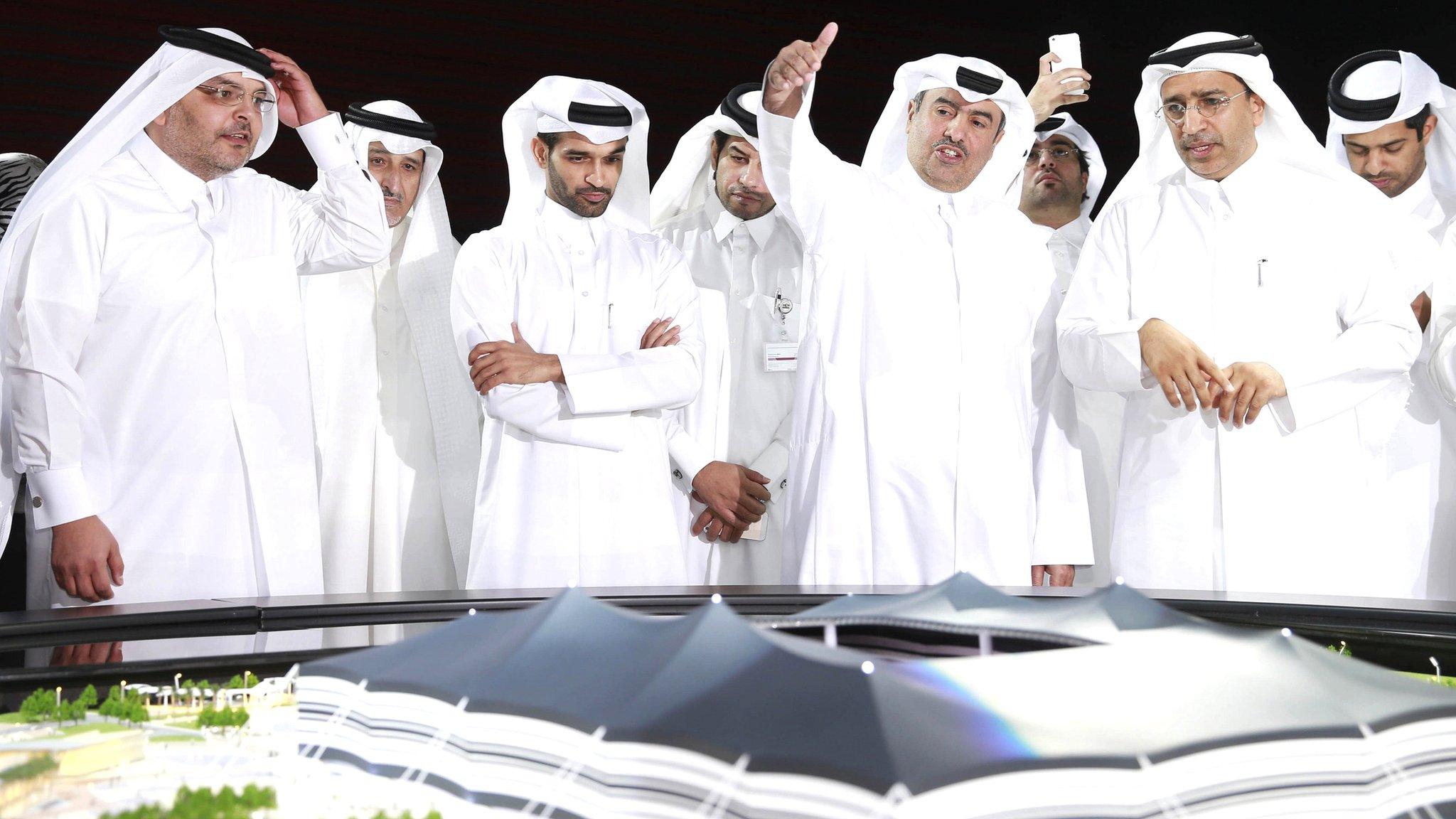Qatar 2022 World Cup: Michel Platini wants winter staging
- Published
'No regrets' over Qatar 2022 World Cup - Uefa chief Michel Platini
Uefa president Michel Platini has told BBC Sport the 2022 Qatar World Cup must be played in winter.
The Frenchman's stance puts him in direct opposition to some of Europe's biggest leagues and clubs, who want the event to be staged in May.
The World Cup is usually held in June and July, but Fifa has been told that Qatar's searing summer temperatures will put players' health at risk.
Platini said: "It'll never be in April, May or June. It will be in winter."
He added the 2022 Champions League semi-finals and final could be moved to June if necessary, saying the clubs would accept whatever decision was made.
"It's not the clubs that are playing, it's the players and it's not possible to play in May when it's 40 degrees," said Platini, 59.
Qatar win right to host 2022 World Cup
The English Premier League, Spain's La Liga and the German Bundesliga think a May World Cup will cause the least disruption as Fifa attempts to find an alternative date to June and July.
But the favourite dates are either November and December or January and February.
Football's most influential figures met in Zurich on Monday in an attempt to agree a solution to one of the sport's most controversial dilemmas, and plan to meet again in January.
The taskforce set up to look into this issue will then present its preferred option to Fifa's executive committee in March.
Fifa's preference is for a switch to November and December.
President Sepp Blatter has already agreed that a World Cup will not clash with the Winter Olympics, which appears to rule out a move to January and February.
But Uefa, which governs European football, is opposed on the grounds it would impact on the Champions League group stages, a stance backed by the Premier League.
Many North American and South American domestic seasons conclude about this time, too.
When will the 2022 World Cup take place? | |
|---|---|
"On the basis that what Fifa wants, Fifa normally gets, a tournament in November/December must still be considered the probable outcome. There will be those who make very strong arguments for January/February and it should not be ruled out yet." | |
Speaking during a tour of the Football Association's training base at St George's Park in Staffordshire, Platini said: "As president of Uefa, I have no problem whether it's in November, December, January or February.
"I have no problem. For the competition of the Champions League, we have no problem.
"Your clubs in England, your league (the Premier League) has a problem… but we have to find a compromise. Everybody has to lose something but in the end I think winter will be a good date.
"It will not be in April, it will not be in May or June or July or September. It will be November, December or January."
When asked how regrettable it was that the issue had still not been finalised four years after Fifa's executive committee voted for Qatar, Platini said: "It's not regrettable for me. I don't regret voting for Qatar."
He also rejected any suggestion the World Cup's credibility had been damaged by the Qatar controversy.
"I don't think so," he said. "I've always said that I hope it will be in Qatar in winter. A lot of people voted for Qatar, not only me."
Platini insisted Qatar was the right choice because Arab countries had bid for the World Cup before and missed out.
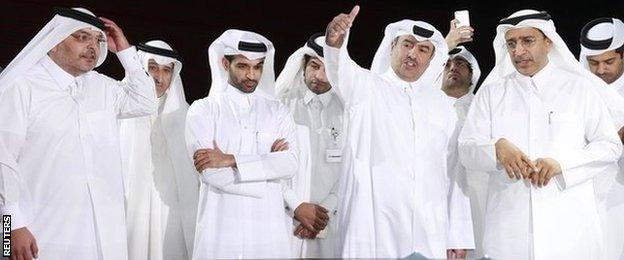
Qatar says it is happy to stage the 2022 World Cup at any time of year
"The Arabic people, seven times they lose the World Cup," he said. "It was time to give them the World Cup. I am for that. It's my conviction."
Platini was also asked whether Blatter had been wrong to promise the International Olympic Committee that there would be no clash with a Winter Games.
"I don't know," said the former France international midfielder.
"There will be an official decision soon. I hope soon because Qatar needs to know when they are going to organise this competition. We'll find a compromise."
Fifa's ethics adjudicator Hans Joachim Eckert is studying lawyer Michael Garcia's report into the 2018 and 2022 World Cup bidding process after corruption allegations were made against the Qatar 2022 bid.
Asked if he still believed Qatar will host the 2022 tournament, Platini said: "If there is some problem of corruption, we have to make another vote. If not, why would we have to change?"
During Wednesday's trip, Platini also discussed Financial Fair Play, Blatter's bid for a fifth term as Fifa president and St George's Park.
Platini on Blatter
The Uefa president reinforced his association's view that Blatter should not seek a fifth term in office in next year's election.
Blatter promised not to stand again when he was last re-elected in 2011, but has since declared he will be a candidate in 2015.
Former Fifa executive Jerome Champagne is the only person to have declared an intention to stand against him.
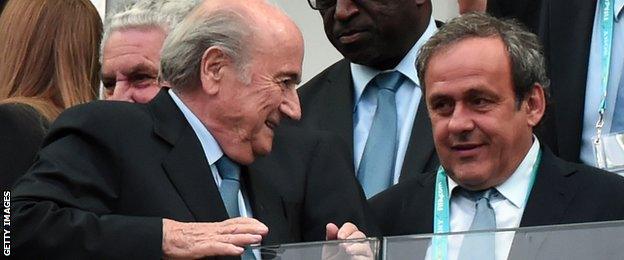
Platini says it is "possible" Blatter could be beaten in next year's Fifa presidential election
"I said many times that I will not support him any more because he asked European football to vote for him for a last time," said Platini.
"After 40 years being involved as the general secretary and president, it's time to have something fresh.
"I am part of Fifa as vice-president, but the image is not so good.
"For the fame of Fifa all over the world, to have better transparency, to have better governance, I think it's time Sepp let his seat."
Asked if he believed Blatter could be beaten, Platini replied: "I hope so. It's possible."
Platini on Financial Fair Play
Uefa made its first Financial Fair Play (FFP) rulings this year, with Manchester City and Paris St-Germain among nine clubs punished.
Platini pushed for the introduction of FFP to prevent clubs that qualify for Uefa competitions spending beyond their means, and to stamp out what he calls "financial doping" in football.
He denied some major clubs were opposed to the idea, but acknowledged the system may need to be altered.
Money matters | |
|---|---|
Uefa made its first FFP rulings based on club accounts from 2011-12 and 2012-13. Under this monitoring period, total losses of €45m (£37m) were permitted, as long as clubs had owners who can cover such amounts. |
"There are not a lot of critics," he said. "There were some clubs who were not so happy, not about the FFP but they were not so happy about the criteria of FFP.
"By example, PSG said there are very, very many taxes in France. And at first they said: 'We would like to have a different judgement about what we have to pay.'
"Nobody will criticise the FFP, but they want to have some accommodations about this."
Platini said former Manchester United chief executive David Gill, now chairman of Uefa's club licensing committee, oversaw a meeting at which possible changes to the system were discussed.
"The committee will propose to the executive committee if there is something to judge or not," he added.
Platini on St George's Park
Platini was impressed by the FA's national football centre, which opened in 2012.
"It is very beautiful, it is modern, it's new, it is very well done," he said.
"Now you have everything, you have to put the quality inside to grow football. But I think for a great country of football like England there is the need for something like that.
"If you educate better players, you will have in your club better players. It means that it is a very good centre to develop football in England."
- Published5 November 2014
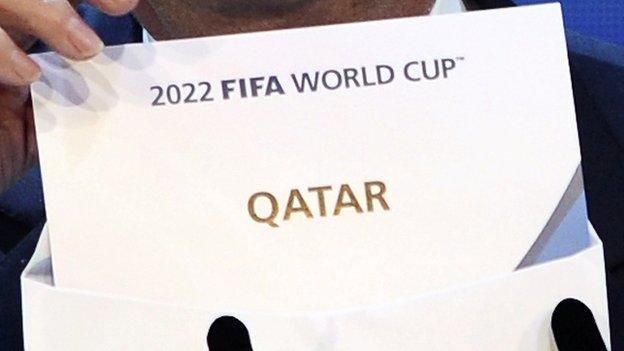
- Published5 November 2014
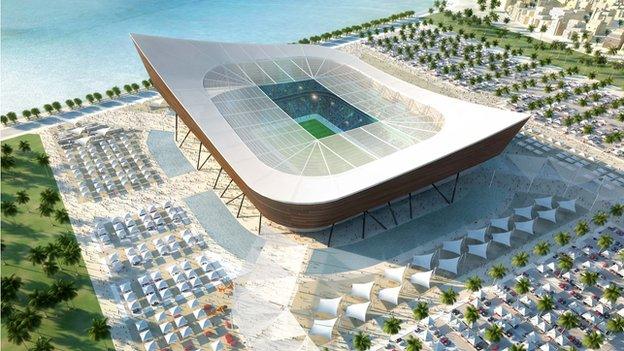
- Published3 November 2014
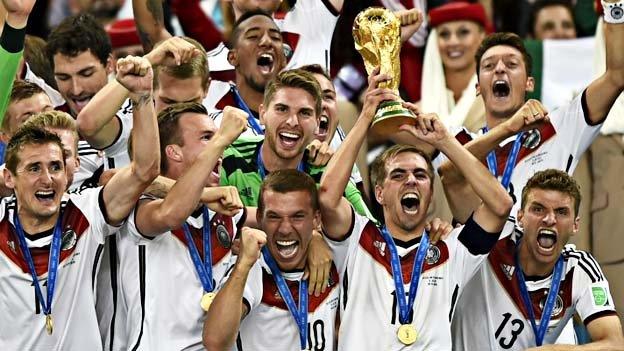
- Published30 October 2014
